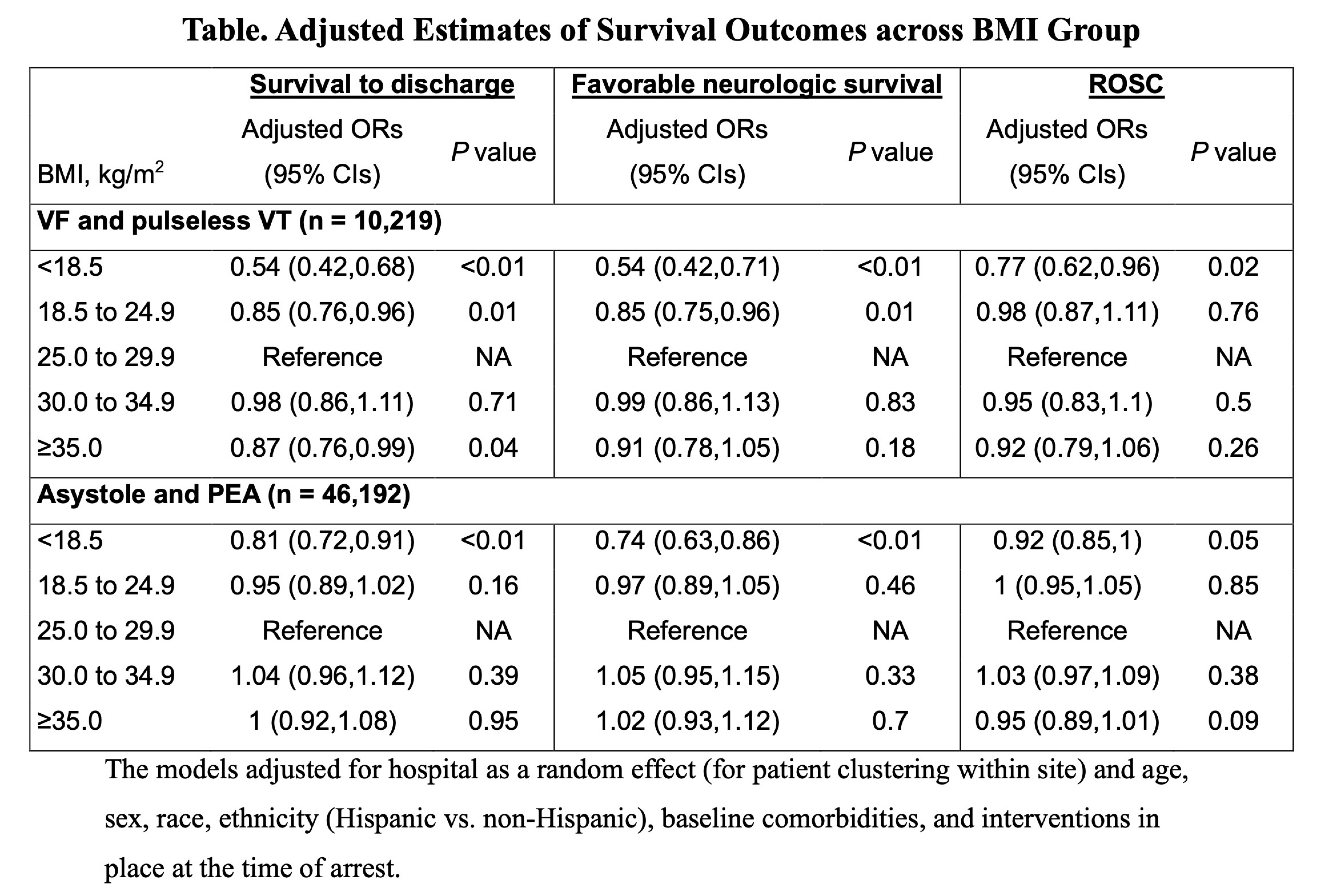Final ID: Su704
Body Mass Index and Outcomes of In-Hospital Cardiac Arrest
Abstract Body: Background: Although previous studies have reported an association between a patient’s body mass index (BMI) and outcomes for various cardiovascular conditions, the relationship between BMI and survival for in-hospital cardiac arrest (IHCA), a condition for which emergent response is required, has not been fully described.
Aims: Examine the association between BMI and survival outcomes for IHCA.
Methods: Within the Get With The Guidelines®-Resuscitation, we identified 56,411 patients with IHCA and available BMI data during 2005-2012 when weight and height data were collected in the registry. BMI was classified as underweight [<18.5 kg/m2], normal [18.5 to 24.9 kg/m2], overweight [25.0 to 29.9 kg/m2], obese [30.0 to 34.9 kg/m2], and very obese [≥35.0 kg/m2]). Using multivariable hierarchical models with hospital as a random effect, we examined the association between BMI and survival to discharge, stratified by cardiac arrest rhythm type (shockable and non-shockable). As secondary outcomes, we examined rates of sustained return of spontaneous circulation for >20 minutes (ROSC) and favorable neurological survival (i.e., survival to discharge without severe neurological disability).
Results: Among 10,219 patients with a shockable arrest rhythm, 3,964 (38.7%) survived to discharge. After multivariable adjustment, compared with overweight patients, those who were underweight, of normal weight, and very obese had lower survival rates, whereas obese patients had similar survival rates (Table). Underweight patients also had a lower rate of ROSC and favorable neurologic survival (Table). Among 46,192 patients with a non-shockable arrest rhythm, 7,331 (15.8%) survived to discharge. After multivariable adjustment, all BMI groups had similar rates of survival, ROSC, and favorable neurologic survival, except for underweight patients (Table).
Conclusions: Although the association between BMI and survival outcomes for IHCA varied by initial rhythm, underweight patients consistently had lower survival rates of survival. Very obese patients generally had similar outcomes to other weight groups, underscoring that morbid obesity was not a negative predictor of survival outcomes for IHCA.
Aims: Examine the association between BMI and survival outcomes for IHCA.
Methods: Within the Get With The Guidelines®-Resuscitation, we identified 56,411 patients with IHCA and available BMI data during 2005-2012 when weight and height data were collected in the registry. BMI was classified as underweight [<18.5 kg/m2], normal [18.5 to 24.9 kg/m2], overweight [25.0 to 29.9 kg/m2], obese [30.0 to 34.9 kg/m2], and very obese [≥35.0 kg/m2]). Using multivariable hierarchical models with hospital as a random effect, we examined the association between BMI and survival to discharge, stratified by cardiac arrest rhythm type (shockable and non-shockable). As secondary outcomes, we examined rates of sustained return of spontaneous circulation for >20 minutes (ROSC) and favorable neurological survival (i.e., survival to discharge without severe neurological disability).
Results: Among 10,219 patients with a shockable arrest rhythm, 3,964 (38.7%) survived to discharge. After multivariable adjustment, compared with overweight patients, those who were underweight, of normal weight, and very obese had lower survival rates, whereas obese patients had similar survival rates (Table). Underweight patients also had a lower rate of ROSC and favorable neurologic survival (Table). Among 46,192 patients with a non-shockable arrest rhythm, 7,331 (15.8%) survived to discharge. After multivariable adjustment, all BMI groups had similar rates of survival, ROSC, and favorable neurologic survival, except for underweight patients (Table).
Conclusions: Although the association between BMI and survival outcomes for IHCA varied by initial rhythm, underweight patients consistently had lower survival rates of survival. Very obese patients generally had similar outcomes to other weight groups, underscoring that morbid obesity was not a negative predictor of survival outcomes for IHCA.
More abstracts on this topic:
Adverse Childhood Experiences (ACEs) and Cardiovascular Health: Future of Families and Child Wellbeing Study (FFCWS)
__PRESENT
__PRESENT
Pedamallu Havisha, Van Horn Linda, Stein James, Korcarz Claudia, Hansen Kristin, Mitchell Colter, Heard-garris Nia, Lloyd-jones Donald, Allen Norrina, Gauen Abigail, Ning Hongyan, Wilkins John, Goldman Noreen, Notterman Daniel, Hou Lifang, Zheng Yinan, Marma Amanda
Adiposomal microRNAs Mediate Vascular Dysfunction in Obesity-Associated Type 2 DiabetesMirza Imaduddin, Morsy Mohammed, Levitan Irena, Raj Usha, Mahmoud Abeer

